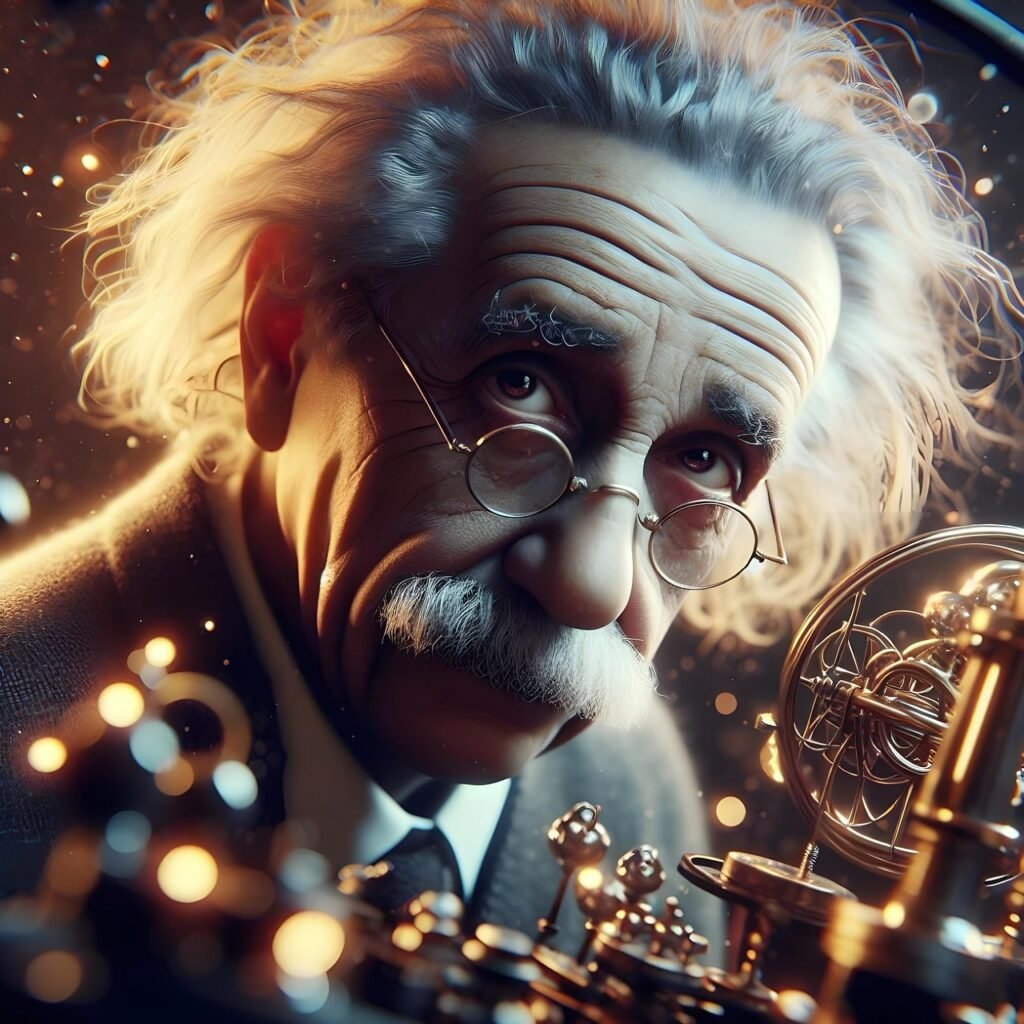Albert Einstein: How Solitude Shaped the General Theory of Relativity

When you hear the name Albert Einstein, a groundbreaking name in science and physics comes to mind.
But many people do not know that behind the success of this extraordinary scientist was the power of loneliness.
He was somewhat socially isolated from childhood, but his solitude set him apart from others.
In this article, we will learn how Einstein’s introverted personality enhanced his creativity and depth of thought, and how he reached the General Theory of Relativity from loneliness.
Einstein's introverted character: Why was he different?
1. Loneliness and deep thinking since childhood
Einstein was quite quiet as a child, and did not feel comfortable talking.
Even his teachers thought he was “less intelligent”.
But he processed his thoughts deeply and thought differently about the world around him.
2. Depth of thought was more important than social skills
Einstein was never very social.
He did not mingle much with friends, but rather immersed himself in the world of his own thoughts.
His ability to do “Gedankenexperiment” or Thought Experiment was extraordinary.
How did loneliness contribute to Einstein’s success?
1. The power to increase the depth of thought
Einstein said:
“I am truly a lone traveler and have never belonged to my country, my home, my friends, or even my immediate family.”
He realized that his thoughts processed best when he was alone.
2. New ideas were born from loneliness
In 1905, he was completely alone and it was during this time that his famous E=mc² equation was created.
In 1915, when he was writing the General Theory of Relativity, he was completely lost in his own world of thought.
3. Mastermind of “Deep Work” and “Focus”
Einstein was one of the examples of Deep Work & Focused Thinking.
He would think alone for hours, even days, to solve a problem.
His thought process was less distraction and more focus.
General Theory of Relativity: An Introvert's Masterpiecee
1. Einstein’s “Miracle Year” and Solitude
1905 is called Einstein’s “Miracle Year” because it was in this year that he published four of his groundbreaking research, including the Special Theory of Relativity.
He was alone at that time, immersed in his research, and this period of solitude made him one of the best scientists in the world.
2. The Discovery of the General Theory of Relativity
In 1915, Einstein published his General Theory of Relativity.
It was a completely new perspective, showing that gravitational force is actually the result of the bending of space and time.
This theory is one of the most important discoveries in the history of science.
3. Global recognition from solitude
In 1921, Einstein received the Nobel Prize.
Although he became famous all over the world, he still preferred to remain in his own secluded world.
What can we learn from Einstein’s life?
There is nothing to fear from solitude. On the contrary, it can be a source of creativity.
Take time to deepen your thinking and practice thinking in solitude.
Practice Deep Work and Focused Thinking—this will increase your efficiency.
Believe in your own thoughts, as Einstein said.
Did Einstein really succeed from solitude?
Undoubtedly, yes!
Albert Einstein is not only famous for his extraordinary brain, but his introverted personality, solitude, and deep thinking ability made him one of the greatest scientists in history.
If you are an introvert, don’t think that you are behind because you are less social.
Instead, think that you can create something new in your own world of thought, like Einstein.
How did loneliness help Einstein?
Albert Einstein was a scientist who turned loneliness into a strength, not a weakness.
Many people see loneliness from a negative perspective, but in Einstein’s case, it was the main engine of creativity.
Here we will analyze:
How did loneliness develop his thinking?
How did being alone revolutionize science?
What can current introverts learn from his life?
Einstein’s experience of loneliness: The path to becoming a scientist from childhood.
1. He preferred a solitary life from childhood
Einstein was never very sociable.
He understood from an early age that he felt most comfortable and could think creatively only when he was alone.
While other children were busy playing, Einstein would sit alone and think.
An interesting fact:
As a child, Einstein was considered a ‘bad student’ by his family because he could not mix easily like others. But in reality, he was thinking deeply in his inner world.
2. The benefits of being free from social pressure
Einstein never attached much importance to social rules.
He enjoyed the freedom of thought rather than a social life.
He would immerse himself in his scientific research rather than unnecessary interactions with people.
His famous quote:
That is, a monotonous and lonely life stimulates the creative mind.
3. Development of deep thinking
When Einstein was alone, he could think deeply about complex issues.
His Gedankenexperiment (Thought Experiment) method was a way to expand his thinking while being alone.
His Theory of Relativity was the result of many years of solitary thinking.
Example:
He thought one day, “If I could travel at the speed of light, what would I see?”
The world-famous Theory of Relativity was born from this one question.
4. The connection between productive routine and loneliness
Einstein knew that solitude helped to strengthen his thinking. So he used his time very systematically.
His routine was as follows:
Morning: Research in mathematics and physics alone.
Afternoon: Completely isolating himself and immersing himself in deep thought.
Evening: Play the violin for a while (this was also part of his creativity).
Night: Write about new ideas and research.
Spending time alone like this made his brain most creative.
5. Loneliness helped him overcome obstacles
Einstein’s life was never easy. He failed many times.
While in school, his teachers said that he would never be able to do anything.
Many people at the university did not take his thinking seriously.
When he published the “Theory of Relativity” in 1905, many scientists distrusted it.
But Einstein believed in his own thoughts and his solitude helped him overcome all these adversities.
How did loneliness enhance Einstein's creativity?
Alone time helped him think deeply.
He focused on his own research, ignoring the opinions of outsiders.
His world of thought was created only in his mind, which later became scientific truth.
He understood that it was important to move forward with his own goals instead of wasting time mixing with everyone.
Lessons for today’s introverts
Don’t think of loneliness as a weakness: Instead, use your alone time to develop your thoughts and skills.
Be free from social pressure: Not everyone will understand you, but if you focus on your goals, you will succeed.
Spend your alone time on creative work: Go deep into your thoughts like Einstein and discover something new.
Trust your thoughts: At first, no one will understand you, but over time, your thoughts will gain value.
Finally: What do you need to do to be successful like Einstein?
Turn loneliness into strength.
Immerse yourself in deep thought.
Stay focused on your goals.
Give more importance to your thoughts than the opinions of others.
Einstein proved that loneliness does not mean weakness, but rather it is one of the keys to success.
Why are introverts' brains perfect for creativity?
Introverts generally enjoy being alone and are immersed in deep thought. This is one of the reasons for their increased creativity.
Studies have shown that the neural connections in the brains of introverts work differently than those of extroverts, which helps them think deeply and generate new ideas.
Introverts have higher dopamine sensitivity in their brains, so they find more pleasure in small things and can pay close attention.
They experience greater Noble Curiosity, so they are eager to learn new things and expand their imagination.
The part of the brain known as the Default Mode Network (DMN) is more active in introverts, which is important for deep introspection and creative thinking.
Loneliness and Creativity: Why Are Introverts More Innovative?
Creative people often say, “The best ideas come when I’m alone.”
But why?
Solitude means deep concentration:
Introverts can easily avoid distractions and think deeply.
They can think about new ideas for a long time, which increases creativity.
Entering their own world:
They create their own “micro world” where they can experiment with new concepts.
This was very important in the lives of great writers, scientists and artists.
Less accepting of other people’s opinions:
Many times, extroverts easily change their ideas after listening to other people’s opinions.
But introverts process ideas within themselves, which helps them create something unique and new.
Scientific explanation of the creative brain of introverts
Studies have shown that the “default mode network” (DMN) of the brain of introverts is more active.
The DMN is the part of our brain that is responsible for our imagination and introspection.
When someone is alone and immersed in deep thought, this network becomes active.
That is why introverts like to be alone and experiment with new ideas.
Some of the world's famous introvert creative people
1. Albert Einstein – His theory of relativity is the result of deep thought in solitude.
2. Bill Gates – He always thought of new ideas in programming and business alone.
3. Elon Musk – He lived alone as a child, spoke little, but used his great thinking power to create large companies like SpaceX and Tesla.
4. J. K. Rowling – Wrote the Harry Potter stories in his alone time, which is still one of the most popular book series in the world.
5. Leonardo da Vinci – He used to sit alone and draw, paint, and sketch, which is still world famous.
General Theory of Relativity: An Introvert's Masterpiece
Albert Einstein, a quiet, introverted man, whose thinking power has changed the course of modern physics.
His greatest discovery, the General Theory of Relativity, was the result of many years of deep meditation spent in solitude.
Solitude: The Secret Weapon of Creativity
Einstein always liked to be alone. From school to work, he was always immersed in his own world of thoughts.
When he worked at the Swiss Patent Office, he developed his famous ideas sitting alone in the quiet atmosphere of the office.
The main idea of the Theory of Relativity
The General Theory of Relativity, published in 1915, said that time and gravity are related.
It explained how large objects create gravitational fields and how time and space (space-time) are curved.
The role of an introverted perspective
Deep thinking: Einstein was no ordinary thinker. He developed this theory by conducting “thought experiments” alone for many years.
Challenging Conventions: Introverts generally love to think outside the box, as Einstein did.
From Solitude to Innovation: Einstein believed, “Solitude is the source of creativity.”
Final Thoughts
Einstein’s General Theory of Relativity is a reflection not only of science, but also of the extraordinary intelligence of an introvert.
His solitude, deep thoughts, and ability to think outside the box made him one of the world’s greatest scientists.
“I like to walk alone, because that’s when my best ideas come to me.” —Albert Einstein
Can you learn anything from Einstein’s life? Go here and tell us in the comments.
- Category : Introvert Articles
- Author : Tuhin Bin Alamgir



